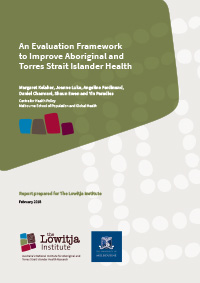Framework for evaluation of policies, programs and services

Development of framework for evaluation of policies, programs and services that aim to improve Aboriginal and Torres Strait Islander health and wellbeing
Project aim and objectives
This project aimed to develop a framework to guide future evaluation activities aimed at Aboriginal and Torres Strait Islander policy, programs and services oriented towards health equity. Its objectives were to:
- Determine the key principles that underpin evaluation of any policy, program or service that aims to improve Aboriginal and Torres Strait Islander health and wellbeing.
- Understand the key elements in a systems-based framework to guide evaluations of any policy, programs or services that aim to improve Aboriginal and Torres Strait Islander health and wellbeing.
- Identify the key elements that support and advance Aboriginal and Torres Strait Islander community level engagement in relation to policy, programs and services evaluation to inform local decision-making processes.
- Determine the indicators or evaluation questions, for which data could be collected relevant to each identified element at the different levels.
- Identify the key elements of good practice evaluation at a policy or program level.
- Identify the elements of previous program evaluations that have demonstrated good practice.
Project team
Project leader: Professor Margaret Kelaher, Centre for Health Policy, Melbourne School of Population and Global Health, University of Melbourne
Project partner: Deakin University
Administering organisation: The University of Melbourne
Project timeline: 01/07/2018—31/12/2018
Methodology
- Established project reference group
- Project reference group identified organisations to be consulted and/or key informants to be interviewed
- Literature and document review completed
- Facilitated workshop for practice in evaluation of Aboriginal and Torres Strait Islander health initiatives
- Administered survey
- Identified case studies
- Conducted final workshop
- Finalisation of framework and recommendations
Project findings
The key principles underpinning many government programs to improve Aboriginal and Torres Strait Islander health and wellbeing included: shared responsibility, cultural competence, engagement, equity, partnership, capacity building, accountability, evidence-based and a holistic concept of health.
The key elements in a systems-based framework to guide evaluations of policy, programs or services were identified as:
- translation from evaluation into action, including providing feedback to communities about evaluation findings
- Aboriginal and Torres Strait Islander leadership and partnership in the evaluation process
- building the evidence base, including better access to evaluation information and findings
- evaluation and ethics, specifically that current ethical guidelines are tailored to investigator-driven research rather than involving various parties.
Key elements that support and advance Aboriginal and Torres Strait Islander community level engagement included:
- making evaluation relevant to communities
- sharing the benefits
- orientating ethics to the benefit the community
- enacting and evaluating principles for working with Aboriginal and Torres Strait Islander people
- promoting data sovereignty, including both leadership and ownership of evaluation reports and data
- Aboriginal and Torres Strait Islander leadership in evaluation
- developing capacity for commissioning Aboriginal and Torres Strait Islander evaluation.
Key indicators or evaluation questions, for which data could be collected, included:
- partnerships with Aboriginal and Torres Strait Islander organisations and communities
- shared responsibility
- engagement with Aboriginal and Torres Strait Islander people and communities
- capacity building of Aboriginal and Torres Strait Islander communities
- equity
- accountability
- evidence based
- holistic concept of health
- cultural competence
- data governance and intellectual property
- capitalising on Indigenous strengths.
The study identified many aspects of good practice evaluation involving evaluators, commissioners and program implementers. Some of these included:
Development stage:
- engaging communities and stakeholders and establishing processes to ensure accountability
- establishing program governance, engaging with partnerships and enabling Aboriginal and Torres Strait Islander leadership.
Implementation stage
- developing long-term partnerships between program implementers/ACCOs and community to build capacity around program implementation
- using training and employment to build community capacity to support program implementation.
Evaluation stage
- establishing evaluation governance, engaging with program governance and enabling Aboriginal and Torres Strait Islander leadership
- building Aboriginal and Torres Strait Islander evaluation capacity through training and employment over the long term.
Knowledge translation
- ensuring evaluation findings/data are available to participating communities and building capacity around the use of evaluation findings/data
- developing policy/program response to evaluation reports and ensuring responses are publicly available in perpetuity.
Project outcomes
|
Knowledge |
|
||
|
Awareness |
|
||
|
Behaviour |
|
||
|
Skills |
|
Related resources:
- M. Kelaher, J. Luke, A. Ferdinand, D. Chamravi, S. Ewen & Y. Paradies 2018, An Evaluation Framework to Improve Aboriginal and Torres Strait Islander Health, the Lowitja Institute, Melbourne
- Policy brief
- Knowledge Translation Forum 2018 presentation, Prof. Margaret Kelaher VIDEO
- Knowledge Translation Forum 2018 interview with Ms Fran Eades VIDEO

